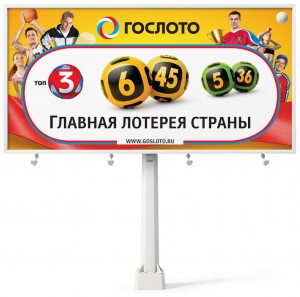The future of the Russian lottery

Should we expect the Russian lottery nationalization?
Right now there are two state ran lotteries in the Russian Federation, with the Gosloto 6/45 and 7/49 being preferred by players. The two games organize draws every week and the jackpots count in tens and even hundreds of millions of rubles. For Gosloto 6/45 the odds of scooping the jackpot stands at one 8 millions, while players have one chance in 86 million to win the main prize in the 7/49 game. The federal government intends to ban all private lotteries by the end of 2013, which would dramatically limit the options of Russian lottery players.
Record-breaking jackpots are expected
The officials are claiming that the regulations would have a two-pronged effect, on the one hand making the games more secure and on the other boosting existing jackpots. The two Gosloto games have already made many millionaires since they were introduced, but the highest amount ever won didn’t exceed 300 million rubles. In the United States the records were broken when Powerball officials decided to double the price of tickets, but the measure was initially dismissed as greed. It looks like the Russian lottery will not use the same recipe for increasing the size of jackpots, but the alternative is highly controversial.
Another reason for why the authorities are contemplating the ban on all private Russian lotteries is that the government hopes to raise more money for the World Cup 2018. There are several other major lotteries worldwide which directs a significant part of their revenue to financing sports events, with the British National Lottery business the perfect example. Team Britain enjoyed substantial financial support and some make the link the positive results to these financial incentives. With transparency being a major issue in Russia, many doubt that the additional funds will reach those who need and deserve it.
More people buy Russian lottery tickets each year
The government took notice of the existing trends which suggests that roughly 7% of the Russian people are playing the lottery and their numbers are expected to increase in the foreseeable future. By limiting the number of Russian lotteries that are allowed to operate nationwide, the authorities hope to channel all the existing and new players to state-run games. The immediate effect would be an increase of revenue for the federal budget with the optimistic scenarios suggesting amounts of 10 billion rubles the equivalent of $300 million. Even if the estimations are slightly exaggerated, the boost is obvious and consistent.
As the criticism intensifies about these announced measures, the officials try to convince the audience that the decision is meant to protect players. Not all existing lotteries are running a straight business, and at least in theory the authorities will have an easier job in monitoring a handful of state run lotteries. The wheels are set in motion and although the law is yet to be enacted very few doubts the outcome, so 2014 can mark the beginning of only one state owned Russian lottery.

Marry Levental is a writer and content contributor at LotteryPros with a genuine passion for both lotteries and storytelling. Known for her energetic writing style and attention to player concerns, Marry covers everything from platform reviews to industry news with clarity and heart. She brings a balanced perspective to her articles, always aiming to help readers make informed, confident decisions. Her enthusiasm for the lottery world is evident in every piece she writes.